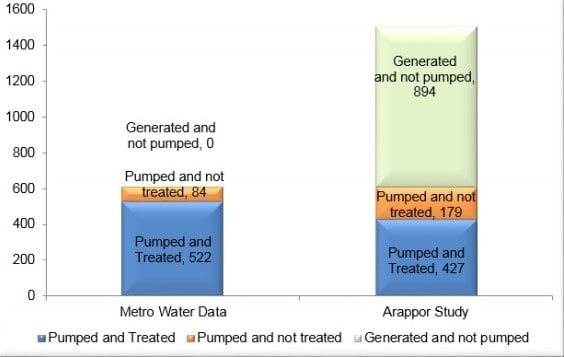During the 2015 floods, civil rights and advocacy group Arappor Iyakkam had carried out relief work for the common man in an organized manner. Once the worst was over, they pondered whether it would be enough to just engage in relief work every single year when disaster strikes or more prudent to work to make sure that such an incident never ever occurs again.
Translating thought to action, over 20 volunteers started ground work from March 2016 when they started the social audits on water bodies. A part of the waterbodies team concentrated on sewage issues and more specifically on ‘Why Chennai Stinks.’
A detailed audit of Chennai’s sewage woes and how to solve the problem was released on May 31, 2017.
The background: Claims vs reality
The Chennai Metro Water Supply and Sewerage Board (CMWSSB) claims that the city generates 550 MLD of sewage every day, which is sent to the 727 MLD capacity Sewage Treatment Plants (STPs), hence 100% of sewage is being treated.
The fact however is quite different. While Metrowater claims that they generate 550 MLD, their data clearly shows that they pump 604 MLD of sewage and treat 522 MLD everyday. Arappor’s study clearly suggests that we generate nearly 1500 MLD of sewage every day, out of which only 605 MLD is pumped and only 427 MLD of it is treated. Therefore, nearly 1073 MLD of sewage (1500 MLD generated – 427 MLD treated) is directly let into the water bodies, making them stink.
If what CMWSSB claims was indeed true, we should not have seen any sewage in Cooum, Adyar River or the Buckingham Canal, but it’s a common sight to see raw sewage flowing.
In 2004, a study by A Vaidyanathan, Emeritus Professor, Madras Institute of Development Studies, Chennai and J Saravanan, Former Centre for Science and Environment staff, indicated that a third of the people’s water needs were met by Metro Water while two-thirds came from borewells and other sources. This was also borne out by studies by the Corporation of Chennai itself.
Putting these data into perspective, if Metro water is supplying 830 MLD then 1660 MLD of borewell usage is quite easily possible, hence close to 2400 MLD of water is used in Chennai every day.
We also know that out of the water used, 80% turns into sewage which would translate to around 1952 MLD of sewage a day.
What the audit revealed
Using RTI provisions, the Arappor team did an audit of 27 Pumping stations and 5 Sewage Treatment Plants over a period of six months and the key findings were as below:
- There is discharge of raw untreated sewage into waterbodies by at least 10 of the 27 pumping stations
- The staff is mostly unqualified with absolutely inadequate knowledge about where the sewage is sent
- Basic monitoring facilities such as a flow meter to measure the quantum of sewage collected and treated in both pumping Stations and STPs are missing
- Critical equipment such as primary and secondary clarifiers in STPs are often missing
- Inadequate aeration and treatment results in poorly treated sewage; the results are quite evident as the treated water from the STPs has with a strong smell of sewage and is brown in colour
Though the situation may be grim at the moment, the report recommends various operational initiatives, including installation of specialized equipment, to fix these issues.
It’s crucial that the pumping stations implement the flow meters and level controllers with which to monitor the amount of sewage flow and automatically record the same and make it available online for public viewing. Similarly emission and effluent monitoring should also be part of the installation.
Major funding is required to establish many more STPs with technically qualified staff, but most importantly, the report prohibits any further construction of pumping stations and STPs near water bodies.
Last but not least, alarm systems for STPs and pumping stations are essential to raise alarms and flag the anomaly in case systems are bypassed.
These measures together could go a long way in making it foolproof and efficient.
We are a long way from having clean rivers; however, the first step towards that goal would be an acceptance and acknowledgment by the CMWSSB of the amount of sewage that is actually being generated.
